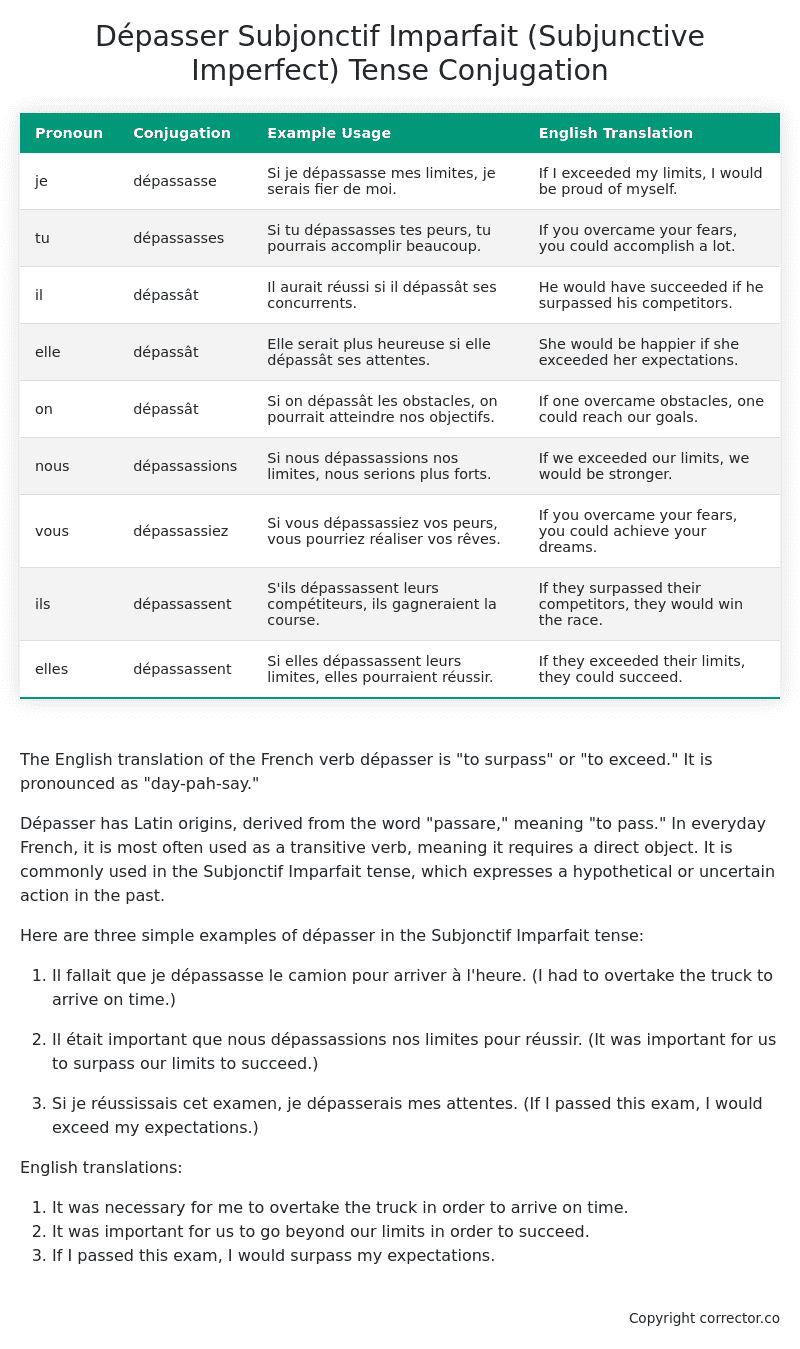Subjonctif Imparfait (Subjunctive Imperfect) Tense Conjugation of the French Verb dépasser
Introduction to the verb dépasser
The English translation of the French verb dépasser is “to surpass” or “to exceed.” It is pronounced as “day-pah-say.”
Dépasser has Latin origins, derived from the word “passare,” meaning “to pass.” In everyday French, it is most often used as a transitive verb, meaning it requires a direct object. It is commonly used in the Subjonctif Imparfait tense, which expresses a hypothetical or uncertain action in the past.
Here are three simple examples of dépasser in the Subjonctif Imparfait tense:
-
Il fallait que je dépassasse le camion pour arriver à l’heure. (I had to overtake the truck to arrive on time.)
-
Il était important que nous dépassassions nos limites pour réussir. (It was important for us to surpass our limits to succeed.)
-
Si je réussissais cet examen, je dépasserais mes attentes. (If I passed this exam, I would exceed my expectations.)
English translations:
- It was necessary for me to overtake the truck in order to arrive on time.
- It was important for us to go beyond our limits in order to succeed.
- If I passed this exam, I would surpass my expectations.
Table of the Subjonctif Imparfait (Subjunctive Imperfect) Tense Conjugation of dépasser
| Pronoun | Conjugation | Example Usage | English Translation |
|---|---|---|---|
| je | dépassasse | Si je dépassasse mes limites, je serais fier de moi. | If I exceeded my limits, I would be proud of myself. |
| tu | dépassasses | Si tu dépassasses tes peurs, tu pourrais accomplir beaucoup. | If you overcame your fears, you could accomplish a lot. |
| il | dépassât | Il aurait réussi si il dépassât ses concurrents. | He would have succeeded if he surpassed his competitors. |
| elle | dépassât | Elle serait plus heureuse si elle dépassât ses attentes. | She would be happier if she exceeded her expectations. |
| on | dépassât | Si on dépassât les obstacles, on pourrait atteindre nos objectifs. | If one overcame obstacles, one could reach our goals. |
| nous | dépassassions | Si nous dépassassions nos limites, nous serions plus forts. | If we exceeded our limits, we would be stronger. |
| vous | dépassassiez | Si vous dépassassiez vos peurs, vous pourriez réaliser vos rêves. | If you overcame your fears, you could achieve your dreams. |
| ils | dépassassent | S’ils dépassassent leurs compétiteurs, ils gagneraient la course. | If they surpassed their competitors, they would win the race. |
| elles | dépassassent | Si elles dépassassent leurs limites, elles pourraient réussir. | If they exceeded their limits, they could succeed. |
Other Conjugations for Dépasser.
Le Present (Present Tense) Conjugation of the French Verb dépasser
Imparfait (Imperfect) Tense Conjugation of the French Verb dépasser
Passé Simple (Simple Past) Tense Conjugation of the French Verb dépasser
Passé Composé (Present Perfect) Tense Conjugation of the French Verb dépasser
Futur Simple (Simple Future) Tense Conjugation of the French Verb dépasser
Futur Proche (Near Future) Tense Conjugation of the French Verb dépasser
Plus-que-parfait (Pluperfect) Tense Conjugation of the French Verb dépasser
Passé Antérieur (Past Anterior) Tense Conjugation of the French Verb dépasser
Futur Antérieur (Future Anterior) Tense Conjugation of the French Verb dépasser
Subjonctif Présent (Subjunctive Present) Tense Conjugation of the French Verb dépasser
Subjonctif Passé (Subjunctive Past) Tense Conjugation of the French Verb dépasser
Subjonctif Imparfait (Subjunctive Imperfect) Tense Conjugation of the French Verb dépasser (this article)
Subjonctif Plus-que-parfait (Subjunctive Pluperfect) Tense Conjugation of the French Verb dépasser
Conditionnel Présent (Conditional Present) Tense Conjugation of the French Verb dépasser
Conditionnel Passé (Conditional Past) Tense Conjugation of the French Verb dépasser
L’impératif Présent (Imperative Present) Tense Conjugation of the French Verb dépasser
L’infinitif Présent (Infinitive Present) Tense Conjugation of the French Verb dépasser
Struggling with French verbs or the language in general? Why not use our free French Grammar Checker – no registration required!
Get a FREE Download Study Sheet of this Conjugation 🔥
Simply right click the image below, click “save image” and get your free reference for the dépasser Subjonctif Imparfait tense conjugation!

Dépasser – About the French Subjonctif Imparfait (Subjunctive Imperfect) Tense
Formation
Common Everyday Usage Patterns
Interactions with Other Tenses
Subjonctif Présent
Indicatif Passé Composé
Conditional
Conditional Perfect
Summary
I hope you enjoyed this article on the verb dépasser. Still in a learning mood? Check out another TOTALLY random French verb conjugation!


